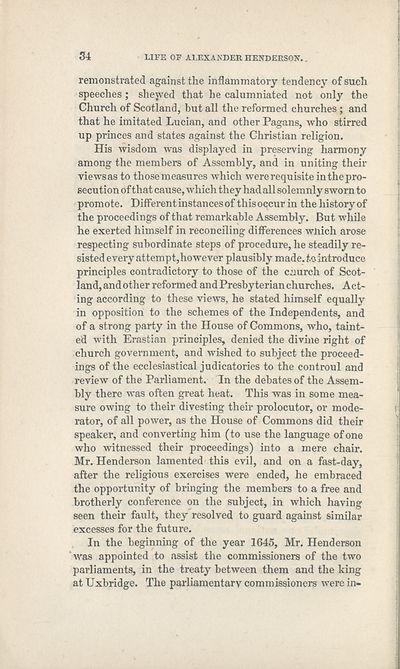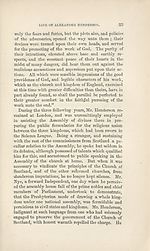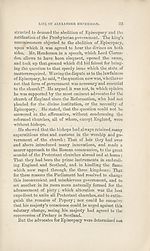Download files
Complete book:
Individual page:
Thumbnail gallery: Grid view | List view

34 LIFE OF ALEXANDER HENDERSON..
remonstrated against the inflammatory tendency of such
speeches; shejved that he calumniated not only the
Church of Scotland, but all the reformed churches; and
that he imitated Lucian, and other Pagans, who stirred
up princes and states against the Christian religion.
His wisdom was displayed in preserving harmony
among the members of Assembly, and in uniting their
viewsas to those measures which were requisite in the pro¬
secution of that cause, which they had all solemnly sworn to
promote. Different instances of thisoqcur in the history of
the proceedings of that remarkable Assembly. But while
he exerted himself in reconciling differences which arose
respecting subordinate steps of procedure, he steadily re¬
sisted every attempt,however plausibly made, to introduce
principles contradictory to those of the cnurch of Scot¬
land, and other reformed and Presbyterian churches. Act¬
ing according to these views, he stated himself equally
in opposition to the schemes of the Independents, and
of a strong party in the House of Commons, who, taint¬
ed with Erastian principles, denied the divine right of
church government, and wished to subject the proceed¬
ings of the ecclesiastical judicatories to the controul and
review of the Parliament. In the debates of the Assem¬
bly there was often great heat. This was in some mea¬
sure owing to their divesting their prolocutor, or mode¬
rator, of all power, as the House of Commons did their
speaker, and converting him (to use the language of one
who witnessed their proceedings) into a mere chair.
Mr. Henderson lamented this evil, and on a fast-day,
after the religious exercises were ended, he embraced
the opportunity of bringing the members to a free and
brotherly conference on the subject, in which having
seen their fault, they resolved to guard against similar
excesses for the future.
In the beginning of the year 1645, Mr. Henderson
was appointed to assist the commissioners of the two
parliaments, in the treaty between them and the king
at Uxbridge. The parliamentary commissioners were in-
remonstrated against the inflammatory tendency of such
speeches; shejved that he calumniated not only the
Church of Scotland, but all the reformed churches; and
that he imitated Lucian, and other Pagans, who stirred
up princes and states against the Christian religion.
His wisdom was displayed in preserving harmony
among the members of Assembly, and in uniting their
viewsas to those measures which were requisite in the pro¬
secution of that cause, which they had all solemnly sworn to
promote. Different instances of thisoqcur in the history of
the proceedings of that remarkable Assembly. But while
he exerted himself in reconciling differences which arose
respecting subordinate steps of procedure, he steadily re¬
sisted every attempt,however plausibly made, to introduce
principles contradictory to those of the cnurch of Scot¬
land, and other reformed and Presbyterian churches. Act¬
ing according to these views, he stated himself equally
in opposition to the schemes of the Independents, and
of a strong party in the House of Commons, who, taint¬
ed with Erastian principles, denied the divine right of
church government, and wished to subject the proceed¬
ings of the ecclesiastical judicatories to the controul and
review of the Parliament. In the debates of the Assem¬
bly there was often great heat. This was in some mea¬
sure owing to their divesting their prolocutor, or mode¬
rator, of all power, as the House of Commons did their
speaker, and converting him (to use the language of one
who witnessed their proceedings) into a mere chair.
Mr. Henderson lamented this evil, and on a fast-day,
after the religious exercises were ended, he embraced
the opportunity of bringing the members to a free and
brotherly conference on the subject, in which having
seen their fault, they resolved to guard against similar
excesses for the future.
In the beginning of the year 1645, Mr. Henderson
was appointed to assist the commissioners of the two
parliaments, in the treaty between them and the king
at Uxbridge. The parliamentary commissioners were in-
Set display mode to:
![]() Universal Viewer |
Universal Viewer | ![]() Mirador |
Large image | Transcription
Mirador |
Large image | Transcription
| Antiquarian books of Scotland > Scotland/Scots > Life of John Knox ; and, The life of Alexander Henderson > (344) |
|---|
| Permanent URL | https://digital.nls.uk/131836432 |
|---|
| Description | Thousands of printed books from the Antiquarian Books of Scotland collection which dates from 1641 to the 1980s. The collection consists of 14,800 books which were published in Scotland or have a Scottish connection, e.g. through the author, printer or owner. Subjects covered include sport, education, diseases, adventure, occupations, Jacobites, politics and religion. Among the 29 languages represented are English, Gaelic, Italian, French, Russian and Swedish. |
|---|

